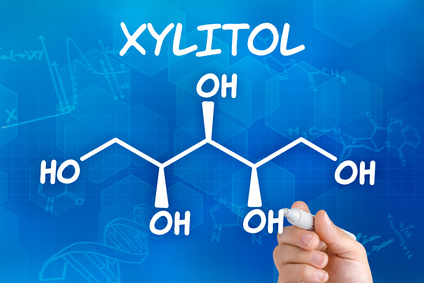Xylitol, a popular sugar substitute, is highly toxic and potentially deadly for dogs. While many of us equate xylitol with chewing gum, there are many other common foods and household items that we may not think about containing xylitol – yet they do and can be harmful, or even fatal, to our beloved dogs. How can we avoid xylitol poisoning in dogs?
What is Xylitol?
Xylitol is a naturally occurring, lower-calorie sweetener derived from either birch trees or corncobs. It is a sugar alcohol that is used in many products as a sugar substitute.
How Does Xylitol Harm Dogs?
When dogs eat something containing xylitol, it may trigger the pancreas to rapidly release a potent amount of insulin. This sudden burst of insulin, in turn, may result in hypoglycemia, a rapid and dangerous decrease in blood sugar levels.[1]
Xylitol and Cats
The toxicity of xylitol for cats has not been documented. In addition, cats have a well-known disdain for sweets, and so are far less likely to be drawn to products containing xylitol. However, until documentation proves otherwise, it is prudent to also keep your companion cat far away from any xylitol-containing products.[1]
Symptoms of Xylitol Poisoning in Dogs
Vomiting is commonly the first sign of xylitol poisoning in dogs. This is followed by other signs associated with sudden hypoglycemia, including:
What to Do if You Suspect Your Dog Ate Xylitol
If you suspect your dog has eaten or chewed xylitol, rush him to the nearest emergency veterinary facility or your regular veterinarian. There is no time to waste. The effects of xylitol and dogs can quickly become deadly.
Common Products Containing Xylitol
Many commonly used “human” products contain xylitol. Here are a few notable ones:
- Cakes, candy, cookies and other baked goods
- Chewable vitamins (children’s and adult’s)
- Chewing gum
- Chocolate (which is toxic for dogs in its own right)
- Condiments
- Cough syrup
- Cosmetics
- Desserts
- Face, body and hair care
- Flavored waters and drink powders
- Gelatin
- Gum
- Honey and other sweeteners
- Ice cream
- Jams and jellies
- Mouthwash
- Medications (never give human medications to a dog without consulting your vet)
- Mints
- Mixes
- Peanut and other nut butters
- Protein bars and protein powders
- Sauces and gravies
- Syrups
- Toothpaste and other oral care products
- Vitamins and supplements
- Yogurt[1]
- Even certain types of clothing can contain xylitol![3] Please visit Preventive Vet for a full list.
The list continues to grow as more and more products are introduced with xylitol or are changed without our knowledge to contain this lethal sweetener to dogs. Before you give any product made for humans to a dog, be sure to read the label.
Originally posted 2018-06-21 08:34:40.








